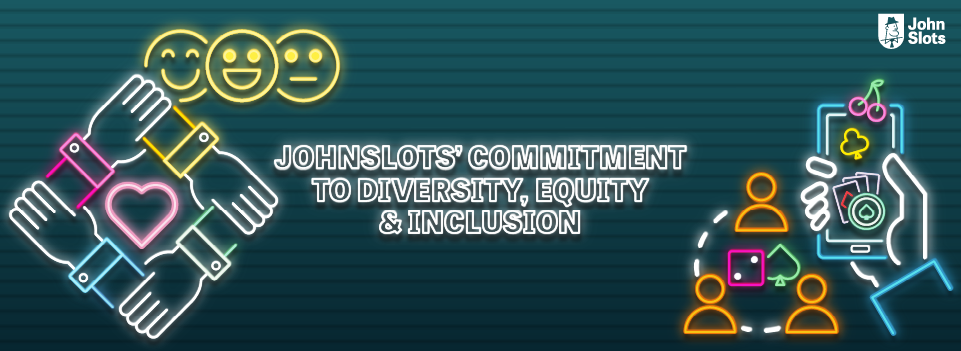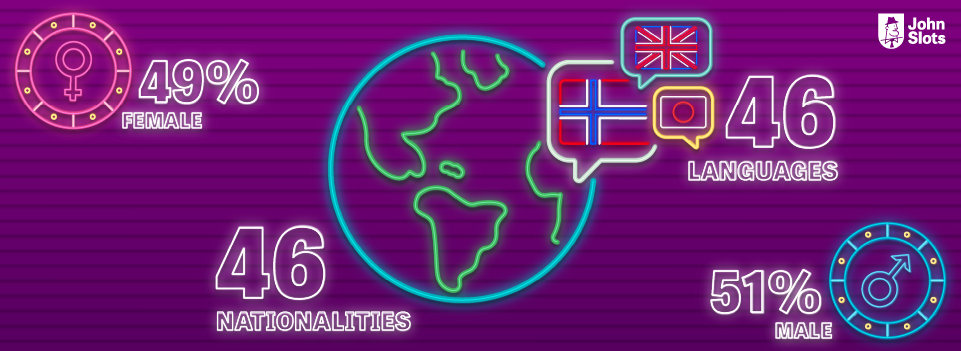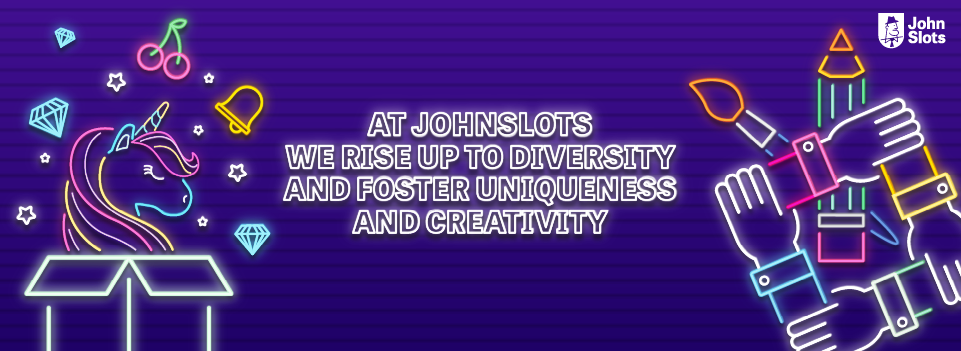
At JohnSlots, we believe that people are more innovative, creative, and successful when they feel welcome, valued, and respected. This belief drives our unwavering commitment to fostering an environment where every voice is heard, every perspective is valued, and every opportunity is accessible.
Our objective, and the objective of Gentoo Media, our parent organisation, is to create a workplace as diverse and inclusive as the community we serve. We want to ensure that everyone has an equal seat at the table, regardless of identity or background.
Our diverse team of over 300 colleagues represents 46 nationalities and speaks 46 languages, with a nearly equal gender split of 49% female and 51% male. We operate mainly from offices in Denmark, Malta, Serbia, and Spain, with nearly 70 team members working remotely worldwide.

At JohnSlots we rise up to diversity and foster uniqueness and creativity
Why Does Diversity, Equality, and Inclusion (DEI) Matter in the Workplace?
DEI in the workplace creates an environment where every individual feels safe, welcome, and empowered to achieve their full potential. It ensures that everyone, regardless of their role in the organisation, feels equally involved and supported in all areas of the workplace, leading to better business outcomes through:
- Higher revenue: Companies with diverse management teams make 19% more revenue. (Source: BCG)
- Better decisions: Diverse teams make better decisions 87% of the time compared to individuals. (Source: CIPD)
- Improved performance: Differences of age, ethnicity, gender and other dimensions foster high performance. (Source: Gartner)
- More innovation: Diverse teams have more innovative ideas and decisions. (Source: Great Place to Work)
- Higher employee retention and engagement: When employees trust their employer’s commitment to DEI, their engagement can increase by 20% and the likelihood they will leave their organisation can decrease by 87%. (Source: Deloitte)
In addition to better business outcomes, DEI practices can help create a harmonious and equitable society and break down archaic views and behaviours by fostering a culture of respect and equality that extends beyond the workplace.
Still, not all businesses and organisations implement DEI initiatives—a report by the Chartered Institute of Personnel Development (CIPD) revealed that just under half (47%) of UK employers don’t have a dedicated DEI strategy in place. Another study revealed that 36% of UK adults report experiencing discrimination at work and 34% of participants feel they’ve been rejected for a job due to discrimination.
At JohnSlots, we play our part by adopting inclusive recruitment processes and implementing equal opportunities policies that give every candidate, regardless of their background, a fair chance to succeed and contribute to our team. More on that below.
We are firm believers of equal pay for equal work—all employees should receive equal payments for working jobs that require comparable efforts, skills, responsibilities, and working conditions. These values help us advance our DEI goals by addressing the inequities that contribute to the gender pay gap.
What Is a “Gender Pay Gap” and Why Does It Matter?
According to the Office for National Statistics (ONS), gender pay gap refers to the difference between the average earnings of men and women expressed as a percentage of men’s average earnings. It is not a measure of the difference in pay between men and women doing the same job—instead, it shows the difference between the average pay of women and men across all organisations and industries in the UK.
Although pay equity laws in the UK have been around since the Equal Pay Act of 1970, the gender pay gap persists. The good news is that it has been declining over time—the table below compares the gender pay gap for median gross hourly earnings in the United Kingdom in 1997, 2010, and 2023, to illustrate the decline.
| Year | Full time | Part time | All employees |
|---|---|---|---|
| 1997 | 17.4% | 0.6% | 27.5% |
| 2010 | 10.1% | -4.3% | 19.8% |
| 2023 | 7.7% | -3.3% | 14.3% |
The gender pay gap for all employees is considerably higher than that of full-time and part-time employees because a larger proportion of women work part time, so they earn less per hour.
💡Here are some other interesting facts about the gender pay gap, according to the ONS.
- The gender pay gap for full-time employees is 14.2% for those over 60 years old, 10.3% for those over 40, and 4.7% for those under 40.
- The gender pay gap is much higher among higher earners compared to lower-paid employees.
- The gender pay gap is higher in all English regions than in Scotland, Wales, or Northern Ireland.
Closing the pay gap is a crucial part of a successful DEI program because a group of people earning less than another for similar roles undermines the principles of equality and fairness. It can also decrease motivation, increase turnover, and dampen employer reputation.
One of the ways we try to close the gap and further our DEI initiatives at JohnSlots is by employing a race-neutral approach to recruitment and selection.
JohnSlots’ Race-Neutral Recruitment Approaches
To promote diversity, equity, and inclusion in our workforce, we make all our hiring decisions based on skills, experience, and qualifications instead of race. Some of the ways we achieve this include:
- Blind hiring: We advise candidates against using a picture in the CV. It allows us to evaluate each candidate’s skills, experience, and qualifications without biases or stereotypes associated with racial or ethnic groups.
- Flexibility: We promote flexibility, so our freelancers can achieve better work-life balance.
- Language: We use neutral language to ensure our hiring process is free from stereotypes or discriminatory language.
We also ask for feedback from our readers and all stakeholders working on our site to help us identify and address any potential biases. It allows us to level the playing field for everyone, regardless of their background.
If you are interested in becoming a part of the JohnSlots family, take a look at our Careers page where you might read in more detail about our recruitment processes.
Empowering every talent, embracing every difference—our path to a diverse and thriving team.
The Law in the UK Governing Diversity, Equality, and Inclusion
The UK has various laws and regulations in place to protect people from discrimination in the workplace and society. Let’s explore them in detail while highlighting how we follow them.
The Equality Act 2010
The Equality Act 2010 legally protects people from being discriminated because of their:
- Age
- Gender reassignment
- Marriage or civil partnership
- Pregnancy or maternity leave
- Disability
- Race
- Religion or belief
- Sex
- Sexual orientation
These are called “protected characteristics”. The law also covers discrimination by association, which protects people from being discriminated against because someone close to them has any of the protected characteristics.
JohnSlots prohibits discrimination against anyone and has clear procedures for handling issues related to discrimination to ensure fairness. We also seek regular feedback from our community to understand their experience and identify any barriers to equality.
The Human Rights Act 1998
The Human Rights Act 1998 contains the fundamental rights and freedoms that everyone in the UK is entitled to. It allows people to take human rights breaching cases to court.
To protect the rights set out in the Human Rights Act, we have an equality and human rights policy that set the standards to which we are committed in relation to employment and management. We also have a human rights roadmap, which details our human rights and employment objectives and the steps we will take to realise them.
What is The Equality and Human Rights Commission (EHRC)?
The EHRC is an independent statutory body that was established to promote and protect human rights and prevent discrimination. It operates across England, Scotland, and Wales, with a separate body, the Equality Commission for Northern Ireland, serving Northern Ireland.
The EHRC protects human rights, prevents discrimination, and fosters equality and diversity by:
- Enforcing the Equality Act 2010.
- Helping people understand their rights and responsibilities by providing information and guidance.
- Researching systemic issues, gathering evidence, and developing potential solutions.
- Advising the government on the potential effect of laws on equalities and human rights.
- Carrying out inquiries on patterns of inequality, discrimination, and human rights abuses and proposing solutions.
Our Plans for the Future
We believe that inclusivity should extend to our website, so we are always looking for new ways to make it easily accessible to a broader audience. Here’s how we plan to do that.
Ensure Smooth Website Functionality for All UK Users
We will keep on improving our website functionality to ensure it works smoothly for all British users regardless of their location.
It will help promote equity by ensuring we provide equal access to information and services without excluding any group due to their infrastructure and geographical location. It’ll also foster diversity by welcoming users from diverse backgrounds, including those in underserved and rural areas.
Optimise Website Accessibility Across Bandwidths and Devices
We will keep optimising our website to make it accessible across bandwidths and devices to ensure that everyone, including people with limited resources or older tech, can access it. It’ll help reduce the digital divide by ensuring that everyone is included, regardless of their location, economic situation, or level of tech access.
Design for Diverse Physical and Cognitive Needs
To meet the Web Content Accessibility Guidelines, we take into account the physical and cognitive abilities of our readers in our website design. This approach ensures the website can be used by everyone, including people with disabilities.
By providing equal access to information and opportunities—a fundamental aspect of equity—we help promote a culture of inclusivity where everyone’s needs are considered.
Engage Users for Continuous Improvement Through Feedback
We strive to involve members of our community in our processes and actively solicit their feedback. It helps us understand how to best meet everyone’s needs—not just those of a select few.
Involving our community helps us identify and address any disparities or barriers that may exist, ensuring that we serve all users equitably. It also helps empower underrepresented groups by giving them a say in how we develop and maintain the site.

 Send Us Your Feedback
Send Us Your Feedback
We are always looking to improve and be better for our team and community, but we need your help to achieve our goal.
If you have suggestions on how we can make JohnSlots more welcoming or if we have ever said something to which you took offence, kindly let us know. Your suggestions and ideas are invaluable in our pursuit for a diverse, equitable, and inclusive workplace and community.
An Update on JohnSlots’ DEI Efforts
📖 Read our interview with JohnSlots’ Head of Content – Archie Williamson, about our DEI policy update and what the future holds for our company.
References to the Cited Sources
Here is a list of references, arranged by order of appearance on this page:
- 📄Boston Consulting Group. (2018). How diverse leadership teams boost innovation. BCG. https://www.bcg.com/publications/2018/how-diverse-leadership-teams-boost-innovation
- 📄People Management. (n.d.). Diversity drives better decisions. https://www.peoplemanagement.co.uk/article/1742040/diversity-drives-better-decisions
- 📄Gartner. (n.d.). Diversity and inclusion build high-performance teams. https://www.gartner.com/smarterwithgartner/diversity-and-inclusion-build-high-performance-teams
- 📄Deloitte. (n.d.). Building employee trust: The role of DEI programs. https://www2.deloitte.com/uk/en/insights/topics/talent/building-employee-trust-dei-programs.html
- 📄HR Magazine. (2021). Diversity and inclusion an afterthought for nearly half of employers. https://www.hrmagazine.co.uk/content/news/diversity-and-inclusion-an-afterthought-for-nearly-half-of-employers
- 📄CIPHR. (2021). Workplace discrimination statistics. https://www.ciphr.com/infographics/workplace-discrimination-statistics
- 📄Office for National Statistics. (2023). Gender pay gap in the UK: 2023. https://www.ons.gov.uk/employmentandlabourmarket/peopleinwork/earningsandworkinghours/bulletins/genderpaygapintheuk/2023
- 📄UK Government. (2010). Equality Act 2010: Guidance. https://www.gov.uk/guidance/equality-act-2010-guidance
- 📄UK Government. (1998). Human Rights Act 1998. https://www.legislation.gov.uk/ukpga/1998/42/contents
- 📄World Wide Web Consortium. (2018). Web Content Accessibility Guidelines (WCAG) 2.1. https://www.w3.org/TR/WCAG21/



